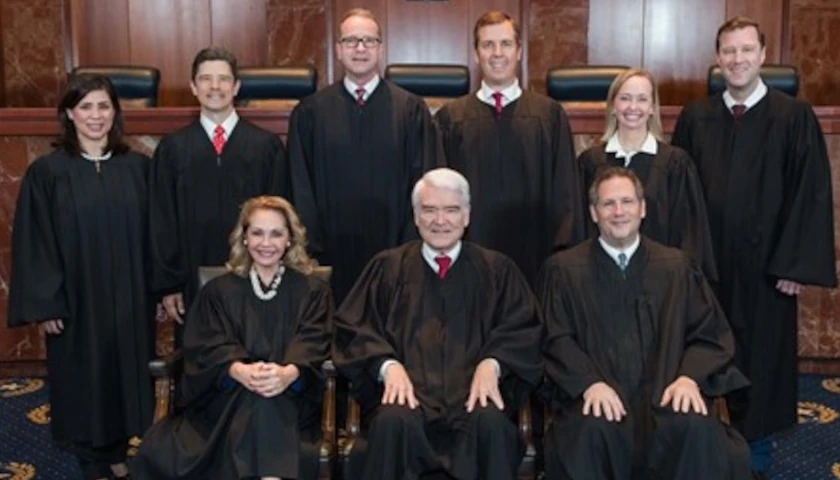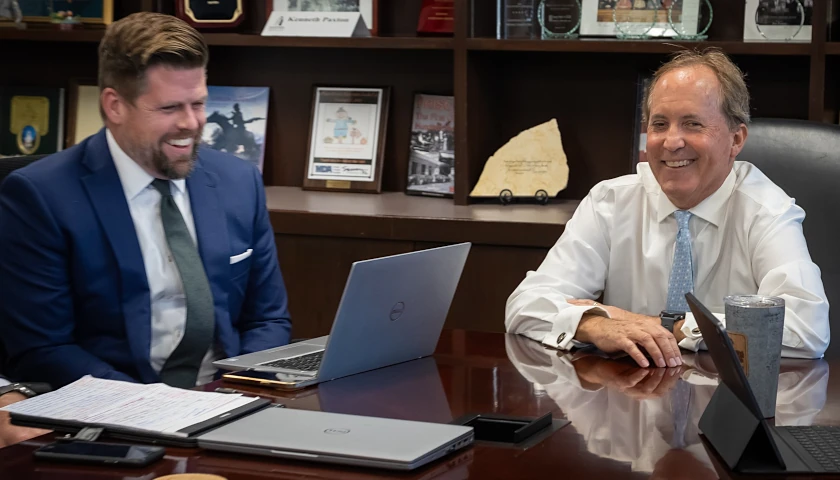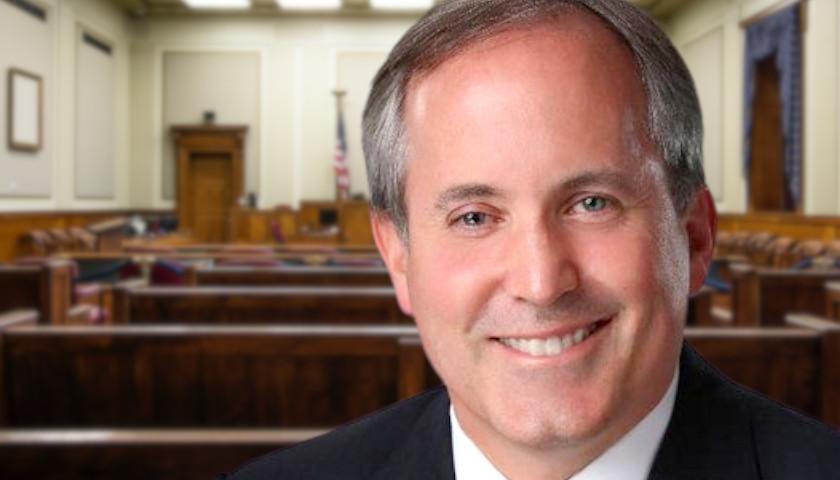The Texas Supreme Court heard oral arguments on Thursday appealing the State Bar of Texas’s discipline of Texas Attorney General Ken Paxton’s top deputy for bringing the election lawsuit Texas v. Pennsylvania with Paxton over the election irregularities in four states in 2020, which was joined by 21 other states. The bar’s Commission for Lawyer Discipline filed lawsuits against Paxton and First Assistant Attorney General Brent Webster in 2022 asking for sanctions over allegedly violating several broad, vague ethical rules increasingly used to target conservative attorneys.
The bar claimed that Paxton (pictured above, right) and Webster (pictured above, left) violated the ethical rule against making “false statements of material fact or law to a tribunal” when they alleged there were unregistered voters and other types of illegal votes, and that tabulators from Dominion Voting Systems switched votes from Donald Trump to Joe Biden. They were also accused of violating an ethical rule that prohibits conduct “involving dishonesty, fraud, deceit, or misrepresentation” and a third rule that prohibits bringing frivolous claims.
A trial court judge initially ruled in favor of Webster in September 2022, but on appeal, an intermediate court issued a split decision, suspending his license. The Texas Office of the Attorney General (OAG) appealed to the Texas Supreme Court (SCOTX) arguing that the bar’s actions infringe on its constitutional duties. The Texas 5th Circuit Court of Appeals is still handling Paxton’s appeal.
Aaron Nielson, solicitor general for the OAG who is currently on leave from his position as a law professor at Brigham Young University, began his oral argument stating that disciplining Webster for this “is so broad that every lawyer in Texas’ license is at risk. … We’re talking about what was essentially a complaint filed in the United States Supreme Court. The Supreme Court did not think it was frivolous or sanctionable, nor did any party argue that it was.”
He went on, “In my entire career, I have never seen anyone sanctioned for conduct remotely similar to what we are talking about here. … This suit is a direct attack on the separation of powers.”
Nielson, Paxton and Webster have sovereign immunity that protects their official actions, which “wouldn’t protect unlawful behavior or other other behavior outside of the scope [of their official actions].”
The bar’s attorney, Michael Graham, seemed confused about where the bar stood on several aspects of the charges. When one of the justices asked him if the bar was alleging that the allegations were “knowingly false,” he responded, “I don’t think we are currently alleging that they were knowingly false, necessarily. I think we’re alleging that some of the factual representations were false and then it ended up being false or were known by people who made them to be false at the time that they were made, that doesn’t necessarily mean, I suppose that the people who made them knew they were false at the time. I think that’s a factual inquiry.”

Justice Jimmy Blacklock (pictured here, standing third from the left) addressed Graham, “The voting machines had problems. There’s serious doubts about the integrity of the election overall. So in November of 2020, those allegations sound entirely reasonable and probable to about half the country, and they sound outrageous and sanctionable to the other half of the country. So what is the difference between those two groups of people?”
He went on, “The obvious difference between the two groups of people is their political perspective and their interpretation through the lens of politics of disputed and controversial events related to an election. The only perspective from which the lower case makes any sense is the perspective taken by the half of the country who views the scores of allegations as sanctionable and frivolous. The other half of the country looks at this and thinks, ‘sanctionable, what are you talking about?’ Maybe it’s true. Maybe it’s not. But in November of 2020, it sure seemed reasonable to me, and maybe if there had been discovery and more evidence and the case had gone further, some of this could have been proven.”
Blacklock continued, “How you look at whether this case is sanctionable or reasonable, is your interpretation through the lens of politics, of these controversial political events, and so I cannot understand. It’s hard for me to understand how this case is anything other than a government entity taking a particular view of that disputed political question and then insisting that the Attorney General of Texas take the same view and not side with the 50 percent of people who had questions about the election.”
Graham argued back, claiming it wasn’t party specific. “I’m not sure that it’s a fair generalization to say that everybody might have concerns about the efficacy or validity of voting is the line of one party and not in line with another party,” he said.
Blacklock pressed him, “If you have a basis to believe it might be true and you allege it, the fact that it turns out not to be true surely can’t be sanctionable. Or we’d have thousands and thousands [of bar disciplinary proceedings] just like this all the time.”
Justice Jane Bland said objections to the pleadings should have been handled during the case itself, not brought up later as a bar complaint. “But if the allegation is that the statement and the pleading was knowingly false or without sufficient support, at some point that should have been tested right in that before the tribunal, and maybe before the tribunal in which the case was paid, right before, before you can put someone’s law license in jeopardy. When you have to have some finding of bad faith or that the statement was knowingly false, and obviously the place that that generally happens is before the tribunal itself.”
Graham argued back and claimed it wasn’t necessary.
Justice Brett Busby asked him, “Is there any situation where discipline has resulted from this process for asserting a legal theory?” Graham said he didn’t know.
Busby responded, “The rules say explicitly that a lawyer can make arguments saying the law is wrong on this and I want to change it.” Graham agreed.
Justice Jeffrey Boyd asked Graham to clarify which of the four accusations against Webster the bar was continuing to assert. Graham said they were not faulting him for filing the lawsuit or for the cause of action he chose. He said the bar was going after him for allegedly fabricating evidence and providing false facts.
Blacklock compared it to recent redistricting legislation, where allegations of racism surfaced. “But maps hadn’t even been passed yet,” he said. “They believed if they got to discovery, they’d be able to show it was true. … Are those cases sanctionable because they’re, they come from a certain political perspective? And then they would need discovery later in order to prove all of the claims that they’re making.”
Graham responded, “It’s not necessarily sanctionable to say we believe there’s irregularity. It may be sanctionable to say there were 6,000 votes cast in this state’s election, that were cast by non-registered voters, when that state can then demonstrate that’s just not what our numbers show.”
Blacklock shot back, “So the whole world just has to take the state of Pennsylvania’s word for whether or not the state of Pennsylvania had a perfect election — doubting that and asking the courts to look into that is sanctionable?”
Justice Evan Young asked Graham, “We say, in that instance, unless a tribunal refers it to the Commission, we think that that must be accepted as a good faith effort by the constitutional branch of government that is entrusted by the people with the decision making for what suits to file and what to allege and what to argue in those suits. Why would that be something that would not equally discharge our duty as the new district branch to ensure that the rules are followed without subjecting another branch of governments to this unfettered kind of situation we see here anytime someone dislikes it, and now we’re having people from out of state or people who are not party to the case, certainly not the tribunal, treated along that way. Why would that not be a solution to this problem?”
Graham agreed, and said that the court could issue a rule establishing that. Young pressed him on whether the court could just assert that as an interpretation without issuing a formal rule, and Graham agreed.
Blacklock next asked, “Are you aware that the Pennsylvania Supreme Court changed their election laws in the run up to the 2020 election, contravening the ones the legislature put in place because of COVID?” Graham said, “I’m aware that numerous states make changes.”
Blacklock asked, “How is there not at least a colorable argument that under the federal constitution, which requires the state legislatures to set the rules for elections, that that was an issue that people might be interested in, want to listen, the courts might need to answer. How could it be sanctionable?”
Graham looked uncomfortable, responding, “There may be, there may be a colorable argument. And if there is, and I think that it probably — I don’t know the answer to that, offhand, potentially.”
Nielson was given an opportunity to provide a rebuttal. He corrected Graham, stating, “I want to make sure that it is clear there is not an allegation of fabrication of evidence.” Regarding the other accusation against Webster, he said, you can only look at objective pleadings, because you’re not going to be able to get to the mental; it’s an objective standard. You can’t — it’s going to be protected. The point is here, unless there is a complainant as the party, they can’t waive the privilege. So it’s going to have to be based on objective facts. … It has to be an objective standard or otherwise, every case is going to be subject to second guessing because you can always say, sure it’s objectively fine but we need to see — because maybe you didn’t really mean it. … I think that’s going to fall within the protections of the Attorney General’s broad discretion.”
Nielsen wrapped up his remarks, “If we can, as a department at our agency, make those types of calls, because we’re worried about some bar complaint, we’re not going to be able to represent the governor, we’re not going to be able to represent the legislature.”
In April, a national coalition of state attorneys general filed an amicus brief with the court in support of Webster over the “blatant case of politically motivated lawfare launched by the State Bar of Texas.” The brief stated, “The real question in this case… is whether courts will permit the politicization of the State Bars and weaponization of disciplinary rules against elected executive officers discharging their constitutional duties.”
Paxton said in a press release accompanying the filing, “The State Bar is using a disgraceful tactic: weaponizing politically-motivated lawfare to intimidate elected leaders and their staff from upholding the Constitution when it inconveniences their political agenda.“
Paxton previously filed briefs urging to convert the bar into a voluntary organization. Read Webster’s petition for review filed with the Texas Supreme Court.
– – –
Rachel Alexander is a reporter at The Arizona Sun Times and The Star News Network. Follow Rachel on X/Twitter. Email tips to [email protected].
Photo “A.G. Ken Paxton and First Asst A.G. Brent Webster” by A.G. Ken Paxton.





